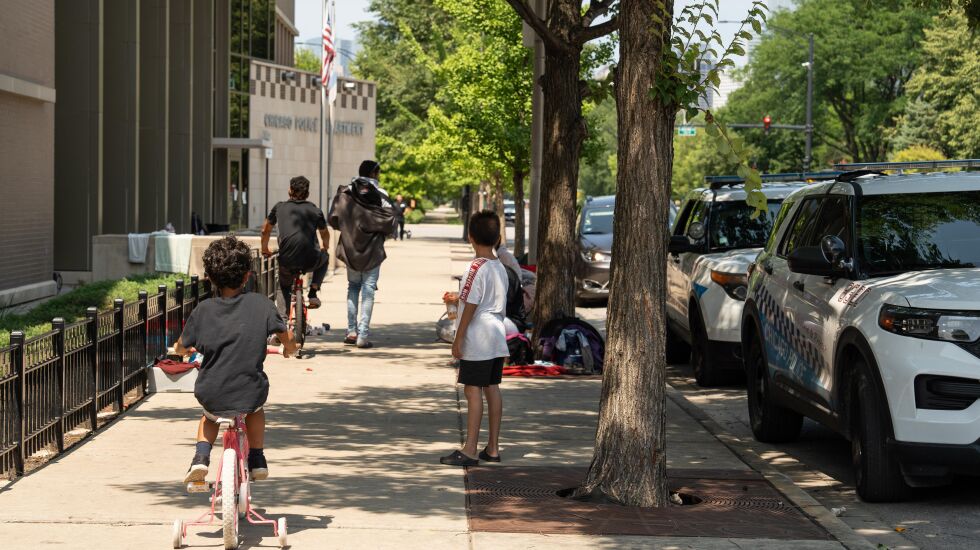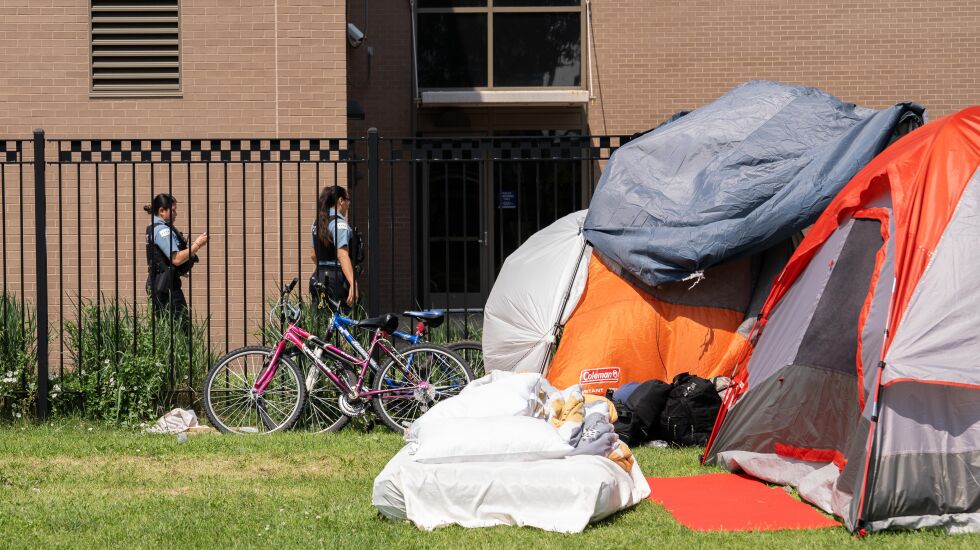
On my way to and from work, I pass by the 12th District Police Station at 14th Street and Blue Island Avenue. Over the past year, it’s come to look a little different now that it’s become a temporary home for asylum-seekers bused to Chicago.
Instead of a sterile and business-like exterior with cops and detectives coming in and out occasionally, it’s taken on the atmosphere of a community center.
There are couples cuddling, enjoying the summer breeze like they’re sitting on their front stoop. Depending on the time of day, one can see guys getting haircuts, kids kicking soccer balls around and mothers watching over small children. Everyone appears to feel safe. In the lot next to the station, pup tents are pitched. It’s like the community’s back yard.
Near the front doors, tables are sometimes set up with boiled eggs, Pop-Tarts and other snacks. Many of these are donated by neighbors — a citizen’s brigade was even established to bring clothing and other resources to various police stations where migrants are being housed. And cops at the 12th District and at stations across the city have risen to the occasion, donating clothes, baby formula, hygiene kits and money.
But growing up in Chicago, these scenes are the antithesis of what we found at most police stations. They weren’t a place where you’d go to hang out. And they definitely were not a place where one felt comfortable pitching a tent, or changing their child’s diaper or finding a free meal during difficult times. Perhaps those scenarios took place now and then, but certainly not to the extent that we’ve seen at police stations over the past several months.
A ‘community anchor’
Back in 2009, when Mayor Richard M. Daley proposed to the Public Building Commission an ordinance setting aside land for the new 12th District police station, he said “it will serve as a new community anchor for the neighborhood, with features that will strengthen the bond between residents and police officers.”
Until recently, it didn’t so much have that vibe, at least from a distance. But now it does, yet likely not under the circumstances Daley imagined at the time.
There’s a lot of discussion in Chicago about our new neighbors and our responsibility as a city and community to welcome them. Some people have complained that they were not consulted before decisions were made about housing the immigrants in their communities. Some people remind us that the compassion and generosity being shown to new arrivals hasn’t always been given to the less fortunate already living here.
Some of the comments have been laced with xenophobia, which is unacceptable. But what I also hear is people saying simply, “What about us?”
Shouldn’t we all feel that police stations — like City Hall and all public buildings — belong to us all? Everyone should feel confident that when we’re hit by a streak of hard luck, we can duck into a police district station to wash up or use the bathroom. Or, if we’re without a place to sleep, we can curl up on an empty bench in the station for the night.
There was a time when popular culture taught us to think this way. A time when Sheriff Andy Taylor or Captain Barney Miller would understand. From what I’ve seen on TV recently, that vibe doesn’t exist on today’s cop shows.

For many Black and brown Chicagoans, the relationship with law enforcement is fraught with tension.
Leonardo Quintero, 33, chair of the 12th District Council under the Community Commission for Public Safety and Accountability, said his relationship with the police while growing up in Pilsen was “more negative than positive.”
But on the district council, Quintero sees his role as helping to establish a “more welcoming environment.” The 12th District’s experience with the asylum seekers “hasn’t been all sunshine and rainbows,” he says, but there have been positive experiences at the station, which has accommodated more than 70 people some days.
Quintero looks forward to the day when police stations are also open and welcoming to the city’s homeless, even having a social worker on site. “I think housing is a human right and should be treated like that.”
When the city does a better job of finding more permanent accommodations for our new arrivals, hopefully our police stations will keep some of the feeling of goodwill for everyone.
Daley envisioned it for the 12th District: A time when we can all view our police stations as “anchors” when we seek shelter from the storm.
Curtis Lawrence is the senior editor of investigations for Block Club Chicago and a former Chicago Sun-Times reporter.
Send letters to letters@suntimes.com
The views and opinions expressed by contributors are their own and do not necessarily reflect those of the Chicago Sun-Times or any of its affiliates.







